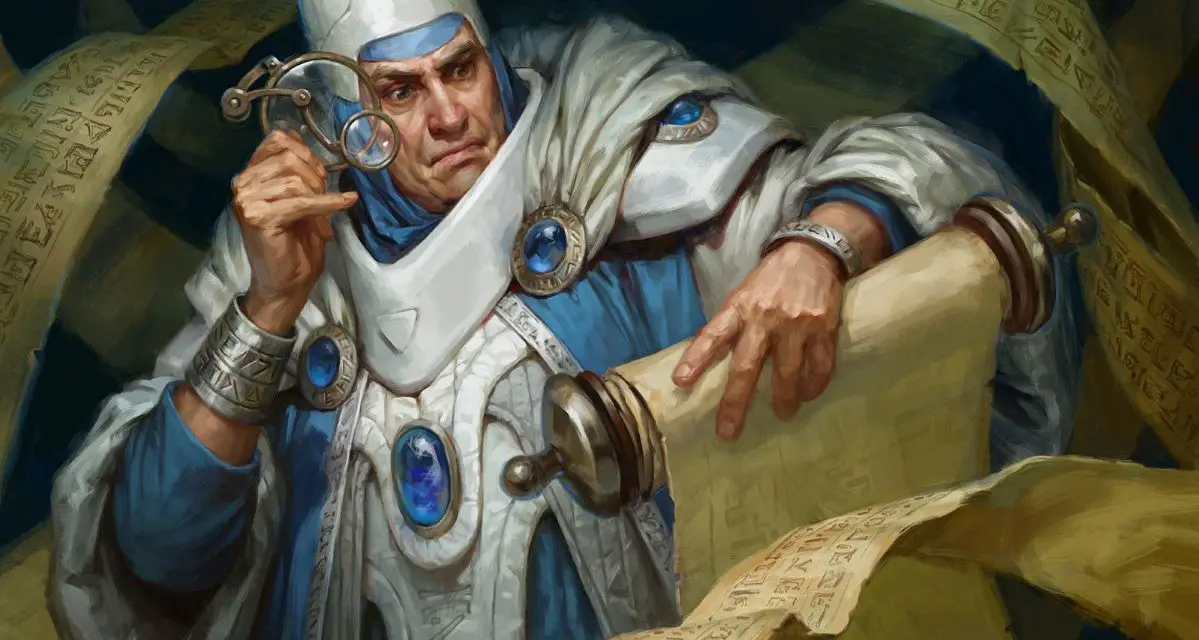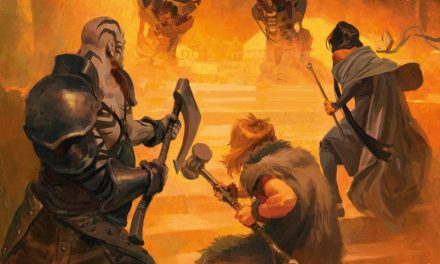Wizards are studious characters, but you would be hard-pressed to find a bigger bookworm than the Order of Scribes Wizard!
Dedicating themselves to learning all there is to know about magic, these Wizards are certainly impressive.
Collecting as much knowledge as they possibly can, these characters commonly have exactly the spell necessary for whatever challenge they encounter.
So, what do you say? Shall we get this study session started?
This is the full guide to the Order of Scribes Wizard in D&D 5e!
What is the Order of Scribes Wizard in D&D 5e?
It’s not incorrect to consider the Order of Scribes Wizard as the ultimate Über-Nerd of the Wizard class. Which, considering that all Wizards are at some level of nerdiness, is really saying something!
Rather than specializing in a specific school of magic, Scribes Wizards dedicate themselves to the study of arcane theory. Pouring through vast tomes of knowledge and constantly searching for new theories to test, these Wizards fundamentally care most about how magic actually works.
Often, Wizards from the Order of Scribes actively work in scholarly communities. There, theories and practices are tested, published, and peer-reviewed as the arcane knowledge base is continually expanded and refined.
Heck, you might even consider the Scribes Wizard as the fantasy version of a regular contributor to Wikipedia. Frankly, I don’t want to live in a world without such people!
But the Scribes Wizard has honed their craft and studied arcane theory to such an extent that they can do things that our dear Wikipedia editors could only dream of…
Not only can they make on-the-fly alterations to their spells, transcribe huge amounts of information into their indestructible spellbook for radically less time and gold, and become a one-person scroll-printing-press…
They can awaken their spellbook to act as a scout drone that is also capable of being used for tactical spellcasting positions!
It’s safe to say that no mortal knows the actual system of magic inside and out better than these Wizards.
It doesn’t get much more Big Brain Energy than this, folks!
You can find the Order of Scribes Wizard in Tasha’s Cauldron of Everything.
Role in the Party
The Order of Scribes Wizard is interesting in that they don’t have the same level of specialization as most other Wizards.
While an Evocation Wizard is blasting foes into ashes or an Enchantment Wizard is causing all kinds of mischief, these Wizards don’t have such a clear-cut role.
Instead, the Scribes Wizard really doubles down on the things that make the Wizard class what it is. They’re studious problem-solvers who excel at having the right spell prepared for whatever the party might encounter.
Fittingly, their features build on the core Wizard features by changing how you learn, prepare, and cast spells.
As with any Wizard, you’re particularly great at providing arcane utility, controlling the battlefield, and helping with Intelligence-based skills like History, Arcana, and Religion.
But that’s really just the beginning.
As your personal library of spells and knowledge continues to grow, your potential impact on any situation grows too.
If you make it a point to acquire and catalog as many spells and as much information as possible, the sky is truly the limit when it comes to the big-brain contributions you provide!

Order of Scribes Wizard Features 5e
There’s a wonderful kind of mystic flavor to the features you gain as an Order of Scribes Wizard. It really takes me back to my childhood obsession with the movie The Pagemaster!
As much as that reference might date me…
Ahem… anyway…
It’s perhaps fitting that many of the Scribes Wizard’s features have VERY lengthy descriptions. But don’t let that scare you off! They’re seriously cool!
Let’s take a closer look at this subclass’s features and break them down a bit, shall we?
Wizardly Quill (Level 2)
Ah, the art of spell copying – a time-consuming but absolutely essential task for any Wizard worth their salt.
But fear not, my dear friend, for with this nifty quill, you can cut down your copying time significantly!
As a bonus action, you can magically create a Tiny quill in your free hand.
The quill doesn’t require ink. When you write with it, it produces ink in a color of your choice on the writing surface.
The time you must spend to copy a spell into your spell book equals 2 minutes per spell level if you use the quill for the transcription.
You can erase anything you write with the quill if you wave the feather over the text as a bonus action, provided the text is within 5 feet of you.
This quill disappears if you create another one or if you die.
Yes, you read that right – you can now copy spells faster than a caffeine-fueled cheetah on roller skates.
And that’s not all!
This quill also doubles as a vandalism tool – but wait, before you start scribbling on your neighbor’s house, let me explain.
While the ink won’t magically stick to objects, with enough time and dedication, you could potentially vandalize a bunch of books, paintings, or whatever else ink would normally stick to.
Just think of the chaos and confusion you could cause!
Or, you know, just stick to copying spells… Yeah, that’s probably the better call…
Unfortunately, be aware that the free ink from your quill doesn’t mean free spell copying. Be prepared to spend some coin on expanding your spellbook.
In fact, it’s a good idea to do A LOT of that…
But, hey, with the time you’ll save using this quill, you’ll have plenty of opportunities to earn some extra gold!
So go forth, my friend, and copy those spells with ease – and maybe leave the vandalism to the mischievous pixies.
Recommended: Using and Managing the Wizard’s Spellbook
Awakened Spellbook (Level 2)
Right off the bat at level 2, the Scribes Wizard shows just what is possible when you truly set out to master the theory behind arcane magic.
Specifically, we’re talking about awakening the arcane sentience of your spellbook.
Who’s the nerd now?!
At 2nd level, while you are holding the book, it grants you the following benefits:
You can use the book as a spellcasting focus for your Wizard spells.
When you cast a Wizard spell with a spell slot, you can temporarily replace its damage type with a type that appears in another spell in your spellbook, which magically alters the spell’s formula for this casting only. The latter spell must be of the same level as the spell slot you expend.
When you cast a Wizard spell as a ritual, you can use the spell’s normal casting time rather than adding 10 minutes to it. Once you use this benefit, you can’t do so again until you finish a long rest.
If necessary, you can replace the book over the course of a short rest by using your Wizardly Quill to write arcane sigils in a blank book or a magic spellbook to which you’re attuned.
At the end of the rest, your spellbook’s consciousness is summoned into the new book, which the consciousness transforms into your spellbook, along with all its spells. If the previous book still existed somewhere, all the spells vanish from its pages.
Nothing quite compares to the feeling of unleashing a powerful spell on your enemies. But what happens when your enemies are resistant to your spell’s damage type?
Fear not, my spell-slinging friend, for the ability to change your spell’s damage type is here to save the day!
By choosing damage types that are rarely resisted, such as Force (yes, Magic Missile, I’m looking at you), Thunder (Shatter, you’re up next), Psychic, Necrotic, and Radiant damage, you can mostly avoid dealing with pesky resistances altogether.
It’s like finding the perfect pair of shoes – comfortable, stylish, and they make you feel invincible.
Of course, to truly take advantage of this feature, you’ll need to learn as many spells as possible. After all, knowledge is power – or in this case, the ability to deal damage without worrying about resistance!
So, if your DM isn’t giving you access to more spells (spellbooks, scrolls, shops, etc.), you may struggle to make this work.
But hey, don’t give up hope – there’s always the option of stealing a spellbook from a rival wizard. Just kidding, don’t do that. (Or do, I’m not your boss.)
And let’s not forget about the third benefit of this feature – the ability to cast a ritual spell more quickly once per day. It’s like having a cheat code for those times when you need spells like Comprehend Languages, Identify, or Detect Magic right now.
Finally, the last benefit of the Awakened Spellbook feature helps you avoid the Wizard’s worst nightmare: losing your spellbook! At the end of a simple short rest, you’re good to go again!
Amazing, right?

Manifest Mind (Level 6)
If you’re like me, you might have joked at times that the books on your shelf are the only friends you need.
As it turns out, the Order of Scribes Wizard takes that to the next level!
As a bonus action while the book is on your person, you can cause the mind to manifest as a Tiny spectral object, hovering in an unoccupied space of your choice within 60 feet of you.
The spectral mind is intangible and doesn’t occupy its space, and it sheds dim light in a 10-foot radius. It looks like a ghostly tome, a cascade of text, or a scholar from the past (your choice).
While manifested, the spectral mind can hear and see, and it has darkvision with a range of 60 feet. The mind can telepathically share with you what it sees and hears (no action required).
Whenever you cast a Wizard spell on your turn, you can cast it as if you were in the spectral mind’s space, instead of your own, using its senses. You can do so a number of times per day equal to your proficiency bonus, and you regain all expended uses when you finish a long rest.
As a bonus action, you can cause the spectral mind to hover up to 30 feet to an unoccupied space that you or it can see. It can pass through creatures but not objects.
The spectral mind stops manifesting if it is ever more than 300 feet away from you, someone casts Dispel Magic on it, the Awakened Spellbook is destroyed, you die, or you dismiss the spectral mind as a bonus action.
Once you conjure the mind, you can’t do so again until you finish a long rest unless you expend a spell slot of any level to conjure it again.
Is there anything magic can’t do?
With this handy feature and the help of your spectral friend, you can now channel your inner drone pilot and explore the world around you from a distance. Even better, you don’t have to worry about batteries or FAA clearance!
Additionally, your spectral mind has darkvision out to 60 feet which is especially helpful if you’re playing as a character race that doesn’t have that feature.
Sure, it’s not exactly subtle – it’s not like it’s invisible or anything – but who needs subtlety when you can also cast spells from its position?!
Of course, the number of times you can do this per day is limited, so don’t rely on it too heavily.
But when you need to do some scouting or want to stay safely behind cover while casting spells from cheeky angles, this is fantastic!
Master of Scrivener (Level 10)
There are two words that are sure to make any spellcaster drool in anticipation: free spells.
Oh yeah, it’s happening!
At 10th level, whenever you finish a long rest, you can create one magic scroll by touching your Wizardly Quill to a blank piece of paper or parchment and causing one spell from your Awakened Spellbook to be copied onto the scroll. The spellbook must be within 5 feet of you when you make the scroll.
The chosen spell must be of 1st or 2nd level and must have a casting time of 1 action. Once in the scroll, the spell’s power is enhanced, counting as one level higher than normal.
You can cast the spell from the scroll by reading it as an action. The scroll is unintelligible to anyone else, and the spell vanishes from the scroll when you cast it or when you finish your next long rest.
You are also adept at crafting spell scrolls, which are described in the treasure chapter of the Dungeon Master’s Guide. The gold and time you must spend to make such a scroll are halved if you use your Wizardly Quill.
With this magical scroll, you’re basically getting a free enhanced spell per day – and who doesn’t love free stuff?
What’s more, since it’s unintelligible to others, you don’t even need to worry about sharing it with anyone else! It’s like having a secret stash of candy that only you know about!
So, what should you do with this newfound power?
Find your favorite 2nd-level spell with a decent effect for being upcast to 3rd level, of course! Mind Spike, Shatter, and Scorching Ray are some solid go-to options.
Though the best part is that you don’t even need to have the spell prepared. That makes this feature great for those “just in case” type spells that might be useful OR might just clog up your list of prepared spells for the day.

One with the Word (Level 14)
Alas, we come to the Order of Scribes Wizard’s capstone feature: One with the Word.
There have been a lot of moving parts to all of the features you’ve gained so far, so why change things now, right?
Not to worry, though. We’ll break it down!
At 14th level, your connection to your Awakened Spellbook has become so profound that your soul has become entwined with it. While the book is on your person, you have advantage on all Intelligence (Arcana) checks, as the spellbook helps you remember magical lore.
Moreover, if you take damage while your spellbook’s mind is manifested, you can prevent all of that damage to you by using your reaction to dismiss the spectral mind, using its magic to save yourself.
Then roll 3d6. The spellbook temporarily loses spells of your choice that have a combined spell level equal to that roll or higher.
For example, if the roll’s total is 9, spells vanish from the book that have a combined level of at least 9, which could mean one 9th-level spell, three 3rd-level spells, or some other combination. If there aren’t enough spells in the book to cover this cost, you drop to 0 hit points.
Until you finish 1d6 long rests, you are incapable of casting the lost spells, even if you find them on a scroll or in another spellbook. After you finish the required number of rests, the spells reappear in the spell book.
Once you use this reaction, you can’t do so again until you finish a long rest.
Advantage on Intelligence (Arcana) checks can potentially be absolutely insane. This skill comes into play when you’re identifying spells or recalling lore about certain magical creatures, objects, and the like.
Though things get a bit trickier with the main part of this feature…
The Cost of Survival
Preventing all the damage from an attack is obviously great in those moments where you’re watching in horror as the DM is grabbing handfuls of damage dice.
For example, maybe you just found yourself on the receiving end of a very nasty Disintegrate spell.
At the cost of a reaction, your spectral mind, and some spells from your book for the next several days, you’re still alive. Most importantly, you aren’t a pile of dust!
But this is absolutely a “for emergencies only” kind of feature.
Outside of those massive damage moments (like If an enemy is walloping you with multiple attacks), you need to determine if you’d be better off casting something like Shield instead.
Honestly, the hardest part of this feature is tracking which spells you have sacrificed and for how long they’re unavailable to you.
If you haven’t been keeping an organized and tidy spellbook, you absolutely need to start doing so now. (I strongly recommend grabbing the 5e spell cards to make this MUCH easier!)
But even beyond your organization skills, this feature specifically rewards you for being a proper Order of Scribes Wizard and collecting as many spells as you possibly can for your book.
Note that the spells that you give up being able to cast are coming from your spellbook and not necessarily only those you have prepared.
You have almost certainly collected several spells that you rarely/never use or can otherwise be fine without for a few days. Those are the ones you want to burn with this feature first before you start cutting into the spells that you use more often.
Additionally, make sure that you also have the spells available to sacrifice for this feature. Being at zero hit points is better than being dead, but it’s still not a good situation to be in!

Connections
As we mentioned earlier in this guide, Order of Scribes Wizards are the absolute definition of the stereotypical “bookish” Wizard.
These characters can certainly be found in abundance when looking at various magic academies. After all, who better to teach classes or tutor their peers?
Of course, whether in such an academy or not, you could certainly expect to find one of these characters in nearly any library or museum that’s worth mentioning.
In fact, many Scribes Wizards would likely make fast friendships with Knowledge Clerics or even more esoteric knowledge-seekers like Circle of Stars Druids!
Because of this, the promise of gaining new knowledge, rare magical artifacts, or simply doing “field research” are all perfectly valid hooks to connect your Scribes Wizard to the party and adventure!
Of course, there is a great deal of organization that goes into the life of a Scribes Wizard. Funny enough, as your spellbook grows, you’ll be forced to become a more organized player yourself!
Personally, I imagine Scribes Wizards as being very particular about such things.
Where some fear demons, undead horrors, or giant spiders, the Scribes Wizard might have nightmares about disorganized bookshelves or encyclopedias with one missing volume.
Gasp! The horror!
Of course, most Scribes Wizards aren’t necessarily selfish about their pursuit of knowledge. In fact, it’s often quite the exact opposite.
Scribes Wizards look proudly at the journals and volumes of scholarly work in the magical community. They tend to strongly believe that new magical discoveries should be studied, recorded, and properly indexed for the betterment of all who dedicate themselves to magical studies.
While these characters do have a constant hunger for knowledge, they also have goals that go beyond themselves!
Is the Order of Scribes Wizard Good?
I absolutely freaking love the Order of Scribes Wizard.
I mean, it’s seriously crazy just how much these Wizards are capable of!
While it’s generally expected that a Wizard will have some kind of specialization, this subclass instead takes a holistic approach to mastering the very core of what a Wizard even is.
That said, getting the most value out of the Scribes Wizard really takes a lot of legwork.
If you aren’t actively collecting new spells for your spellbook like Pokémon, you’re going to have a rougher time. This is especially true with the Scribes Wizard’s capstone feature.
Sure, you’re certainly capable of having an all-night “cram session” if you need to, but it’s much easier to build your spellbook up gradually and consistently throughout your adventure.
Furthermore, you need to have a strong working knowledge of how to best use the spells you’re acquiring. That way, you can make sure that you always have the right spell ready for any job!
Newer D&D 5e players might have a bit of a tougher time playing a Scribes Wizard, but it’s certainly not impossible. There’s just a bit more homework involved.
But if you like diving into the magical elements of your game, have a knack for organization, and like the idea of being the Wizardiest Wizard Who Ever Wizarded, this just might be the perfect subclass for you!
Recommended: Ranking Every Wizard Subclass in D&D 5e!
Conclusion – Order of Scribes Wizard in D&D 5e
I hope you’ve found this guide to the Order of Scribes Wizard in D&D 5e helpful!
Scribes Wizards are obviously going to fit in best in an adventure that has plenty of magic, but WOW, can they really help bring those aspects out in a game!
It might be easy to write these characters off a bit initially. But it’s hard not to love this subclass’s efficiency when it comes to their spell options!
Not to mention, once you hit level 6 and get Manifest Mind, there are virtually limitless shenanigans that you can get up to.
But what are your thoughts on the Order of Scribes Wizard in D&D 5e? Let’s chat in the comments!
Want all the latest player guides, DM tips, news, reviews, and more for D&D 5e? Sign up for the Tabletop Joab newsletter below!
You can also follow us on Facebook and Twitter!
If you found this article helpful and want to support the site, you can buy me a coffee here! (It’s not expected, but very appreciated!)









